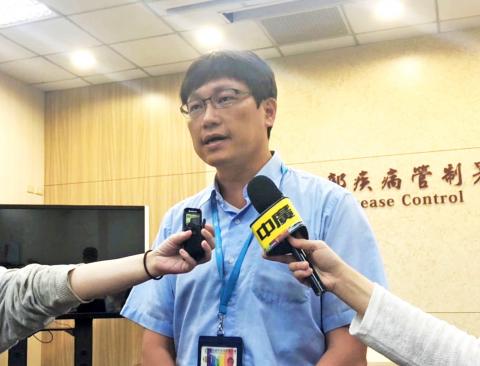The Centers for Disease Control (CDC) on Friday confirmed this year’s first Japanese encephalitis case, urging people to take precautionary measures against mosquito bites as the disease’s peak season approaches.
A man in his 60s from Kaohsiung on May 1 started showing symptoms of fever, headache, convulsions and loss of consciousness, and was immediately hospitalized, the centers said.
He was reported as a suspected case and transferred to another hospital for further treatment on May 5, with test results on Friday confirming that he was infected with Japanese encephalitis, it said.

Photo: CNA
He has since slipped into a coma and is being treated at an intensive care unit, the CDC said.
The man had visited a friend in Kaohsiung’s Daliao District (大寮) and a natural recreational area in Fengshan District (鳳山) during the incubation period, CDC physician Lin Yung-ching (林詠青) said, adding that there is a pig farm and meat market as well as rice paddies near the places he visited, so he might have been infected there.
The Japanese encephalitis season lasts from May to October, with June and July the peak period, Lin said.
Most people show mild to no symptoms at all, but in some cases the patient might develop a headache, fever or aseptic meningitis, which could progress to loss of consciousness, seizures and ultimately death, he said.
About 30 to 50 percent of those who survive the serious symptoms are left with permanent brain damage, muscle weakness, learning difficulties or personality changes, Lin said, adding that young children, elderly people and people with weak immune systems are at higher risk of developing serious symptoms.
Getting vaccinated is the best prevention method, the CDC said, urging parents to have children above 15 months to get vaccinated at local health departments or contracted hospitals.
People should avoid rice paddies, ponds, trenches, animal farms and other places mosquitoes inhabit, especially at dawn and dusk, when they are most active, and take protective measures against mosquito bites when going outdoors, the CDC said.

A preclearance service to facilitate entry for people traveling to select airports in Japan would be available from Thursday next week to Feb. 25 at Taiwan Taoyuan International Airport, Taoyuan International Airport Corp (TIAC) said on Tuesday. The service was first made available to Taiwanese travelers throughout the winter vacation of 2024 and during the Lunar New Year holiday. In addition to flights to the Japanese cities of Hakodate, Asahikawa, Akita, Sendai, Niigata, Okayama, Takamatsu, Kumamoto and Kagoshima, the service would be available to travelers to Kobe and Oita. The service can be accessed by passengers of 15 flight routes operated by

Chinese spouse and influencer Guan Guan’s (關關) residency permit has been revoked for repeatedly posting pro-China videos that threaten national security, the National Immigration Agency confirmed today. Guan Guan has said many controversial statements in her videos posted to Douyin (抖音), including “the red flag will soon be painted all over Taiwan” and “Taiwan is an inseparable part of China,” and expressing hope for expedited reunification. The agency last year received multiple reports alleging that Guan Guan had advocated for armed reunification. After verifying the reports, the agency last month issued a notice requiring her to appear and explain her actions. Guan

GIVE AND TAKE: Blood demand continues to rise each year, while fewer young donors are available due to the nation’s falling birthrate, a doctor said Blood donors can redeem points earned from donations to obtain limited edition Formosan black bear travel mugs, the Kaohsiung Blood Center said yesterday, as it announced a goal of stocking 20,000 units of blood prior to the Lunar New Year. The last month of the lunar year is National Blood Donation Month, when local centers seek to stockpile blood for use during the Lunar New Year holiday. The blood demand in southern Taiwan — including Tainan and Kaohsiung, as well as Chiayi, Pingtung, Penghu and Taitung counties — is about 2,000 units per day, the center said. The donation campaign aims to boost

The Central Weather Administration (CWA) said a magnitude 4.9 earthquake that struck off the coast of eastern Taiwan yesterday was an independent event and part of a stress-adjustment process. The earthquake occurred at 4:47pm, with its epicenter at sea about 45.4km south of Yilan County Hall at a depth of 5.9km, the CWA said. The quake's intensity, which gauges the actual effects of a temblor, was highest in several townships in Yilan and neighboring Hualien County, where it measured 4 on Taiwan's seven-tier intensity scale, the CWA said. Lin Po-yu (林柏佑), a division chief at the CWA's Seismological Center, told a news conference